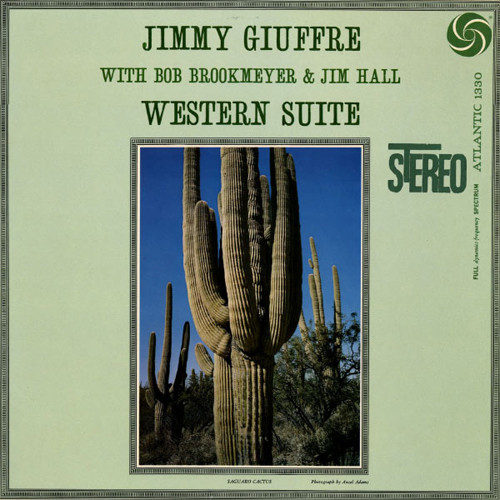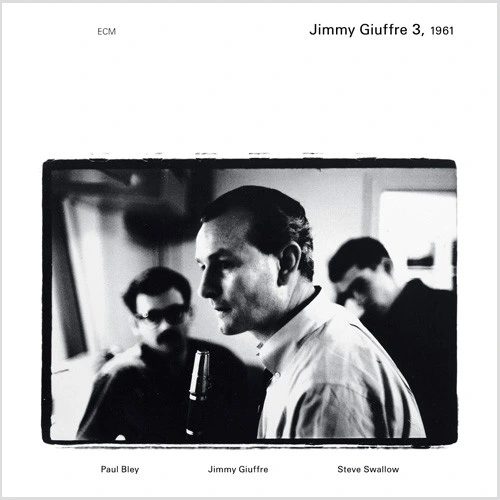180g Vinyl LP! Audiophile Mastering!
In late 1957, jazz saxophonist, clarinetist, composer, and iconoclast Jimmy Giuffre broke up the original Jimmy Giuffre 3 with Ralph Pena and Jim Hall. In early 1958, for a recording session, he formed a new trio without a rhythm section. For the album Trav'lin' Light, his new trio included Hall on guitar and the underrated trombone giant Bob Brookmeyer. For a year, they gigged together up and down the West Coast and played summer festivals, recorded, and even played clubs in New York. They became a trio of adventurous musicians for whom form was not an obstacle to creativity. As the year wound down, Giuffre wanted to document the trio once more, sensing its life was coming to an end. He composed the four-movement "Western Suite" with the trio's strengths in mind, as a way of documenting how they had come together as a band during that year. The piece itself stands as a crowning achievement in a career that included discovering the talents of Steve Swallow and Paul Bley and making the truly revolutionary recording Free Fall for Columbia three years later.
The roots of that thinking lie in this set. Jim Hall's playing was dark, funky, ambiguous, sounding like drums and voices all at the same time -- particularly in the fourth movement. Brookmeyer became the pace setter. His lines were played as stage settings for the other two players to dialogue and narrate against. Giuffre, ever the storyteller, advanced the improvisation angle and wrote his score so that each player had to stand on his own as part of the group; there were no comfort zones. Without a rhythm section, notions of interval, extensions, interludes, and so on were out the window. He himself played some of his most retrained yet adventurous solos in the confines of this trio and within the form of this suite. It swung like West Coast jazz, but felt as ambitious as Copland's Billy the Kid.
The record is filled out with two other tunes, one of Eddie Durham's, "Topsy," and the final moment of mastery this band ever recorded, the already classic "Blue Monk." The easy stroll of the front line with Brookmeyer's trombone strutting New Orleans' style is in sharp contrast to Giuffre's clarinet playing. Which carries the bluesy melody through three harmonic changes before he solos and then plays three more. Hall keeps it all on track, and somehow the piece sounds very natural this way, though unlike "Monk," there are no edges here -- everything is rounded off. This is as solid as any of the earlier or later Jimmy Giuffre 3 records, and two notches above Trav'lin' Light in that it reveals a fully developed sense of the responsibilities, possibilities, and freedoms of reinventing jazz for the trio.
Features:
180g Vinyl LP
Audiophile Mastering
Musicians:
Jimmy Giuffre, clarinet, tenor saxophone, baritone saxophone
Jim Hall, guitar
Bob Brookmeyer, trombone
Selections:
Side One:
1. Pony Express
2. Apaches
3. Saturday Night Dance
4. Big Pow Wow
Side Two:
1. Topsy
2. Blue Monk
In late 1957, jazz saxophonist, clarinetist, composer, and iconoclast Jimmy Giuffre broke up the original Jimmy Giuffre 3 with Ralph Pena and Jim Hall. In early 1958, for a recording session, he formed a new trio without a rhythm section. For the album Trav'lin' Light, his new trio included Hall on guitar and the underrated trombone giant Bob Brookmeyer. For a year, they gigged together up and down the West Coast and played summer festivals, recorded, and even played clubs in New York. They became a trio of adventurous musicians for whom form was not an obstacle to creativity. As the year wound down, Giuffre wanted to document the trio once more, sensing its life was coming to an end. He composed the four-movement "Western Suite" with the trio's strengths in mind, as a way of documenting how they had come together as a band during that year. The piece itself stands as a crowning achievement in a career that included discovering the talents of Steve Swallow and Paul Bley and making the truly revolutionary recording Free Fall for Columbia three years later.
The roots of that thinking lie in this set. Jim Hall's playing was dark, funky, ambiguous, sounding like drums and voices all at the same time -- particularly in the fourth movement. Brookmeyer became the pace setter. His lines were played as stage settings for the other two players to dialogue and narrate against. Giuffre, ever the storyteller, advanced the improvisation angle and wrote his score so that each player had to stand on his own as part of the group; there were no comfort zones. Without a rhythm section, notions of interval, extensions, interludes, and so on were out the window. He himself played some of his most retrained yet adventurous solos in the confines of this trio and within the form of this suite. It swung like West Coast jazz, but felt as ambitious as Copland's Billy the Kid.
The record is filled out with two other tunes, one of Eddie Durham's, "Topsy," and the final moment of mastery this band ever recorded, the already classic "Blue Monk." The easy stroll of the front line with Brookmeyer's trombone strutting New Orleans' style is in sharp contrast to Giuffre's clarinet playing. Which carries the bluesy melody through three harmonic changes before he solos and then plays three more. Hall keeps it all on track, and somehow the piece sounds very natural this way, though unlike "Monk," there are no edges here -- everything is rounded off. This is as solid as any of the earlier or later Jimmy Giuffre 3 records, and two notches above Trav'lin' Light in that it reveals a fully developed sense of the responsibilities, possibilities, and freedoms of reinventing jazz for the trio.
Features:
180g Vinyl LP
Audiophile Mastering
Musicians:
Jimmy Giuffre, clarinet, tenor saxophone, baritone saxophone
Jim Hall, guitar
Bob Brookmeyer, trombone
Selections:
Side One:
1. Pony Express
2. Apaches
3. Saturday Night Dance
4. Big Pow Wow
Side Two:
1. Topsy
2. Blue Monk




 Turntable Accessories
Turntable Accessories Headphone Accessories
Headphone Accessories Cable Accessories
Cable Accessories Vinyl Accessories
Vinyl Accessories Compact Disc Accessories
Compact Disc Accessories







